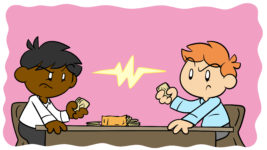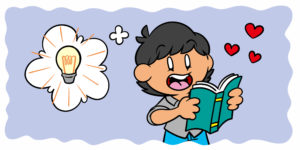Publication takes a lot of hard work. For short story authors it can be the work of a lifetime to write and collect enough top-quality short stories to fill a collection, but the work can’t stop there if they want to achieve publication.
In fact, short fiction may be the most difficult form to find publication for but, armed with the right information and a lot of dedication, it is possible.
In this article, I’ll be exploring the different routes short story authors can take to publication, and the things dedicated authors can do to increase their chances.
First, however, there’s an ugly truth to expose…
The facts about short fiction
Any short fiction author looking to publish a collection will have encountered articles touting a burgeoning upswing in the short fiction market. Sadly these accounts, while often based on good sense and seemingly airtight logic, aren’t an accurate reflection of the market.
‘Short fiction boom’ articles often tie in a supposed increased interest in short fiction with advances in technology. In fact it’s difficult to see how the rise of the electronic reader wouldn’t make short fiction more popular; it’s a convenient way to enjoy reading during busy modern life. Convenience equals more short bursts, and what suits short bursts more than short fiction?
The rub is that every technological advance since before the printing press has been a convenient way to enjoy reading during busy modern life. The e-reader can seem like the definitive game changer because it’s the most prominent in (most of) our lifetimes, but no society has ever considered itself less put-upon than the one before. The e-reader has certainly had an impact on how we read, but that impact has been varied and unpredictable.
That’s not to say there’s no market for short fiction, or even that e-readers haven’t improved the market a little, but many writers approach publication with the belief that they’ve stumbled across a golden age of short fiction and things are going to be easy. Unfortunately that isn’t the case, and belief in this fallacy often makes authors less aware of options that are more likely to lead to success.
To self-publish or not
Publishers, who see trends represented in dollar amounts, know that the market for short fiction isn’t about to explode, and so the vast majority of short story collections they produce are ‘sure things’. These most often feature accomplished authors with some prospective talent along for the ride to increase their exposure, or constitute pre-existing work from an author the publisher wishes to maintain a relationship with. Where lesser known authors are collected it’s often with a focus on a specific subject which the publisher knows there is an existing audience for (you’ll find the most successful collections shelved under ‘erotica’).
Because of this it’s almost impossible to achieve publication with a publishing house if you’re not already an acclaimed short story writer. To those hoping to go this route the most important advice is to enter as many competitions as possible. Not only will a few wins get you taken seriously, but many publishers do search through short fiction competitions for contributors (especially when they already have a big name to help sell the book).
If your heart is set on this type of publication it’s also highly advisable to get a literary agent. You’ll still have to win some competitions, but an agent will help make sure those wins catch the right people’s attention.
Short fiction is difficult to do well but easy to do badly, so there’s quite a crowd you need to stand out from. If you want to be noticed by a third party then you need an impressive biography.
It will take a long time to get an entire short fiction collection published this way. Competitions will lead to contributions, which may lead to someone trusting you enough for a full collection. It’s satisfying, rewarding, and possible, as long as you stay dedicated and keep working towards your goal. It may be, however, that you will find self-publication suits you better.
Self-publishing a short story collection
Much of the same advice applies to self-publishers as to those wishing to find a third party publisher. Acclaim will be necessary to help you stand out from the crowd, and all the dedication you might have put into finding a publisher should now be focused on reading all you can on the self-publishing process. There are also companies that can help you on your journey, by providing advice, editing, marketing and other important publishing services (we’re one of them.)
Where you sell your book is a big decision (there are a few options available) but before that there’s something you can do to maximize the audience for your work.
General advice on creating a collection
There’s one sure-fire way to improve the market for your collection and make it more viable to publishers, and that’s a theme. Many readers are wary of short fiction because it can turn at a moment’s notice – one story might be great, but that doesn’t mean the one after will be. To combat this you can establish a theme for your collection.
This could be something as simple as ‘romance’ and still be effective. The idea is to give readers the comfort of buying a whole rather than a collection of parts, and following a theme has the added advantage of allowing you to target a particular existing market. There are people who set out to read short stories, but your form already engages with them. Better still is to engage with readers who want war stories, westerns, romance stories, sci-fi stories, or thrillers. The selling point becomes ‘it’s a whole collection of stories on something you like’, and their interest in the wider subject combats any trepidation as to content.
Of course the subjects of your stories will vary, but if you can find one unifying theme, no matter how obscure, you’ll see interest rise. Roald Dahl’s short stories are varied and fascinating, but the many volumes in which they’re collected unite them as short fiction with ‘a twist in the tale’. It’s all about suggesting consistency, and giving readers the peace of mind to give you a try.
Good luck!
Whichever path you choose towards publication there will be obstacles in your path, but with enough determination and the right guidance you’ll be able to make it past them. No matter how hard it may seem, remember that bookshops have short fiction sections full of successful authors, and just as there’s no magical boom coming along in the market there’s also not going to be any sudden lack of interest in well-written, audience-targeted short story collections.
If you decide to pursue self-publication the you’ll need to know about Clever book pricing tactics that drive sales, or for more on the benefits of competitions try Should you enter a writing competition?
Are you a published short fiction author, or an aspiring writer who wants to know more? Either way get in touch in the comments and share you experiences.






32 thoughts on “Want To Publish A Short Story Collection? Read This.”
I have a lot of short fictions… I should really group some of them!
Hi boostwriter,
I’d also suggest looking for some competitions that might suit them.
Best,
Rob
I have shot story am looking publisher who can publish my shot story
My cell no [redacted]
Hi Rorisang,
Thanks for your comment! I hope you won’t mind, but I’ve redacted the phone number it originally included. Unfortunately we’re not able to guarantee that personal details shared in the comments won’t be used for mischief. If anyone does get in contact with us regarding your post, we’ll send you a message so you don’t miss out.
If you want to look into ways to find a publisher then I’d suggest the article below, on obtaining a literary agent, or if you want to look into self-publishing then please browse our services page and other blog entries.
//www.standoutbooks.com/literary-agents-authors/
Best wishes,
Rob
my short stories all have plot twists at the end that burn the story into the readers mind, short stories must have plot twists to be any good. my stories are good, i have always written good stories i won australian youth of the year for my story in 2nd grade, my small collection got me a scholarship to university of denver. and im almost finished the collection, i want to publish, and i want nothingnon the cover, no title no author no writtingbat all just a book without anything on the cover. also one of my stories is a true story. a friend of mine is a navy seal he told me this story one night, it is classified but its in the collection regardless
Hi Robert,
It sounds like you have a unique style that works well for you. Your book cover concept sounds striking. A mostly white book cover can be used to grab attention (as with Kyle Kolker’s design for One Red Paperclip) and highlighting the absence of text can make potential readers curious (as with the Penguin covers for 1984). This may be less effective when selling digitally, however, since it may appear that there has been an error with the cover file (or that one has not been provided).
I’d advise against publishing anything that might get your friend in legal trouble – you could ameliorate some of the risk by changing names/dates/details so the events are less recognisable.
Good luck with your collection! If you want to read more on book cover design I’ve included a link to a relevant article below, along with the covers I mentioned above.
//www.standoutbooks.com/get-your-book-cover-design-right/
http://bookdesigners.com/sites/default/files/imagecache/blog_full_width/blog/10-cover-designs-to-chew-on/paperclip.jpg
http://booksat.scarlettrugers.com/bookcoverdesign/wp-content/uploads/2013/10/penguin-1984.jpg
Best,
Rob
Hi Rob
I’m planning a marketing campaign for my forthcoming self published collection of literary short stories called ‘Circling there Moon.’ The stories are eclectic, with the connection between them becoming clear in the last (titular) story, when they are revealed to be the swan song of a dying author looking back over his life.
Any thoughts you may have on marketing such a collection will be much appreciated.
Hi Michael,
Sounds like an interesting collection and a great central idea. If you’d like to contact me at [email protected] I’d be happy to discuss possible marketing plans with you.
For more general advice, you can also check out past articles on marketing:
//www.standoutbooks.com/book-marketing/
Best,
Rob
Hi Rob. I’ve written a collection of short stories of mystery and the surreal. I have yet to come across a publishing company that tells me whether or not to include a synopsis of each story in the manuscript. I know a synopsis is required for a novel, but what about collections of short fiction?
Richard
Hi Richard,
Thanks for a really interesting question. The key thing to remember about writing a synopsis for an agent or publisher is that they’re not just assessing for literary merit, but for whether a) there seems to be an audience for your work and b) if they’re in a good position to sell it.
Because of this, they’re unlikely to want a synopsis of every story – they can check them out in detail when they read the manuscript. What they’re more likely to want is a handful of summaries of the stories that most speak to the themes and reader experience you’re offering, along with an overview of the book as a whole. This is something I talk about more in the article below.
//www.standoutbooks.com/journey-marketing/
Clarity of presentation is key here; explain clearly what you’re doing with the book, how it’s meant to make the reader feel, and then introduce a handful of synopses that show how you’ve gone about it. The exact number will vary depending on how long your stories are, but be aware that, especially with a short story collection, agents and publishers are likely looking for a ‘handle’ – a way of understanding the book as a whole package. After all, that’s what they’ll need if they’re going to sell your work to a publisher/the public.
Finally, remember that agents and publishers want to represent good authors – mention at the end of your message that you’d be happy to send more synopses if needed and they’ll let you know if that’s the case.
Best,
Rob
Thank you so much, Rob, for helping me with this question! I forgot to also ask about a table of contents. I’m almost certain that one is necessary, or am I wrong?
Richard
Hi Richard,
My pleasure. A table of contents wouldn’t be necessary with a query letter, though you should make it clear how many stories there are. If you get to the point of submitting your manuscript, a contents page might be useful, but if it’s something they absolutely need, it should be mentioned on their website or in communications following your query.
Best,
Rob
Good article. I am, at this moment, trying to find an agent or a publisher who would be interested in my collection of 18 short stories called THE POWER OF LOVE. The theme is obviously ROMANCE. All the stories are completely different. How many times have I read through what a publisher or an agent is looking for? Many… Most of them say (amongst other types of writing) that they are not interested in short stories. Sad… I have this manuscript sitting there all dressed up and ready to go…
Hi Phyllis,
It’s a real shame – short fiction is a notoriously difficult market to crack. The readers are out there, though, so hopefully perseverance will win the day. (If not, competitions, collections, and self-publishing are great alternative routes.)
Best,
Rob
Hi,
I’ve read lots of information about publishing fiction short stories. Mostly, it’s almost impossible to get them published except for famous or established authors. What about non-fiction? Why no one talk about writing true life experiences? Some stories I know are true yet, they are said to be fiction. Why?
Hi Wanda,
It’s true that those genres can be hard to market. Not necessarily because there’s a small market – that’s debatable – but because it’s hard to convince readers that they should give an unknown book in those genres a try. Name writers and celebrities tend to dominate because they’re beacons in an uncertain sea – a sea made up of a lot of less-than-stellar alternatives. Marketing non-fiction and short fiction successfully begins with acknowledging that fact, and finding ways to work around it.
Best,
Rob
Hi am Thabelo I wrote a collection of short stories so I need someone who could read my stories and give me feedback and to correct me where I am wrong. I really need your help to achieve my dream
Hi Thabelo,
We’d be more than happy to help you with this – just click the blue ‘START’ button in the top right of the screen to get started.
Best,
Rob
I design my own book covers for my books as I prefer to be able to market my books ie for the kindle and paper back market. I also prefer to include my family as my agent or to ask a friend who has had five books published. The Katherine Howard book about electronic publishing is an excellent book about entering the publishing market. Recently I have published a poetry anthology. If I wanted to publish a short story collection what would you advise as an eye catching title ?
Hi Teddy,
Thanks for commenting. Your ideal title would depend entirely on the content of your book, but it would be a good idea to choose something that speaks to the audience you’re trying to cultivate. With short story collections, a sense of cohesive variety is ideal – for example Neil Gaiman’s ‘Fragile Things’ or Stephen King’s ‘Night Shift’. These titles suggest a wider sense of mood or topic, but also promise different examinations of that mood.
Best,
Rob
Could you please help me out with the following queries:
i) How many words should a short story collection have? (Optimum word range)
ii) How many words should be there per page?
Hi Ted,
The following article should help with your first question, and I wouldn’t worry about the second. Aim for accessible formatting – a sensible font size and spacing – and no-one will mind how many words are on the page.
//www.standoutbooks.com/how-long-book/
Best,
Rob
Hi Mr. Woods, Not sure you are still here because it is Aug 2019 but I would like to know if 13 short stories is good for my first Erotic Fiction Collection. Might I had there is a lot of truth to my stories however I reveal no names. I had hear that 16 was required and anout 1600 words per story. Mine range a little under to 2200. I do believe it will be quite different because of who I am and thw potential of with whom I am writing about. This will be Volume 1. Please advise at will. Thank you very much. Tara Caballero @erotica_x_romance ( my book page for marketing ) or @taracaballero
Hi Tara,
Rub the lamp, and I shall appear, regardless of date. Thirteen stories sounds great for an erotica collection. That said, erotica tends to have different publishing rules; it’s common for erotica authors to release individual stories, or to bunch three to five together for small collections. Depending on the type of erotica you’re writing, this may be what your potential readers expect, and it could be beneficial in other ways (having more work for sale makes you seem more dependable as an author and makes it more likely that search engines and online stores will recommend your work, plus you get to charge for multiple collections, which is probably going to be more lucrative). I’d suggest taking a look at some erotica currently on the market with which you’d hope to share readers and making a decision based on the patterns you observe.
Best,
Rob
Wow! Thank you so much for replying ???????? I am so grateful for this information..I purposefully have not looked at any other stories or authors because I did not want any influence to my own writing or titling, at all…I will do so now, however, as per your professional opinion. Thank you! TC aka EroTica ????
My pleasure. 🙂
I have a collection of 64 short stories averaging 1200 words aimed at girls aged between 12-16 ish. I would like a Literary agent to evaluate them. I write in the first person and in the vernacular. The stories are set in a very expensive young ladies college and follows the day to day trials and tribulations of the boarders of the Boadicea Dorm. I understand boarding school life as I was in one for 9 years.
Sounds fantastic, Bridgette. I can’t put you in touch with an agent directly, but the articles below should be useful in your next steps.
Evaluating An Offer: 12 Things You Need To Know About An Agent
What Literary Agents Do (And Don’t Do) For Authors
I’m stuck and can’t seem to find an answer to this question.
I am currently formatting a manuscript–a 169 page short story collection consisting of 29 short stories, approximately 40,000 words. Would a TOC be inserted on the second page and the first short story begin 1/3 down on the third page with every subsequent story following the same format?
Hi Stclare,
I’m afraid I’d need more information to answer your question. Formatting is a matter of taste, with choices made in order to create a visual effect. Where you want certain things to appear, where you set stories on a page, how consistent the style is; these are all subjective decisions that depend on your intended aesthetic.
Best,
Rob
I am a Nobel Prize nominee and a new writer from Nigeria who will like to send my short story collection and Novel and anthologies of poetry to you What is your phone number and email address
Great and helpful piece,
I have always wanted to make a collection of horror stories from an African eye. I have an enthusiastic audience who love to hear tales of such a genre whenever i tell them, my query is, By combining different stories based on the same genre would this make publishing/self publishing a hurdle for me? Finally will doing such a one off short story collection have any impact on career development should i opt to do a totally different genre when i finally do my first novel in future?